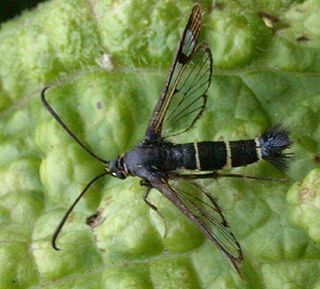
The Sesiidae or clearwing moths are a diurnal moth family in the order Lepidoptera known for their Batesian mimicry in both appearance and behaviour of various Hymenoptera.

The Hepialidae are a family of insects in the lepidopteran order. Moths of this family are often referred to as swift moths or ghost moths.

The Thyrididae comprise the family of picture-winged leaf moths. They are the only family in the superfamily Thyridoidea, which sometimes has been included in the Pyraloidea, but this isn't supported by cladistic analysis.

Apatelodidae, the American silkworm moths, is a family of insects in the order Lepidoptera. They are a family within the superfamily Bombycoidea.
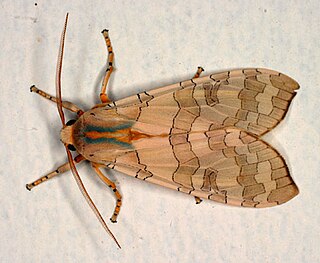
The Phaegopterina are a subtribe of tiger moths in the tribe Arctiini, which is part of the family Erebidae. The subtribe was described by William Forsell Kirby in 1892.

Ctenucha is a genus of moths in the family Erebidae.
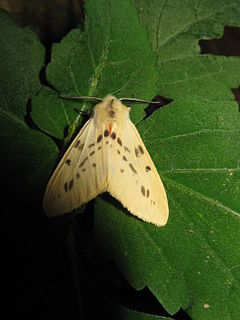
Lemyra is a genus of tiger moths in the family Erebidae. The genus contains many species from East and South Asia, Sundaland and Australia. It was described by Francis Walker in 1856.
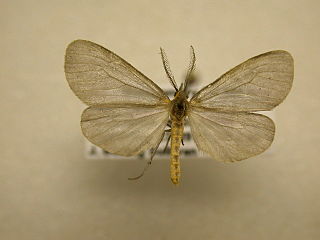
Pagara is a monotypic moth genus in the family Erebidae. Its only species, Pagara simplex, the mouse-colored lichen moth, is found in North America, where it has been recorded from Alabama, Arkansas, Florida, Georgia, Illinois, Indiana, Iowa, Kansas, Kentucky, Maryland, Mississippi, New Hampshire, North Carolina, Ohio, Oklahoma, South Carolina and Tennessee. Both the genus and species were described by Francis Walker in 1856.

Termessa is a genus of moths in the subfamily Arctiinae The genus was described by Newman in 1856.
Tessellarctia is a genus of moths in the family Erebidae.

Somena is a genus of tussock moths in the family Erebidae. The genus was erected by Francis Walker in 1856.
Bracca is a genus of moths in the family Geometridae erected by Jacob Hübner in 1820.

Corula is a monotypic moth genus in the family Geometridae. Its only species, Corula geometroides, the ash-grey geometrid, is found in Australia. Both the genus and species were first described by Francis Walker in 1856.

Acronicta impressa, the impressive dagger moth or willow dagger moth, is a moth of the family Noctuidae. The species was first described by Francis Walker in 1856. It is found from western Canada to north-western Mexico.
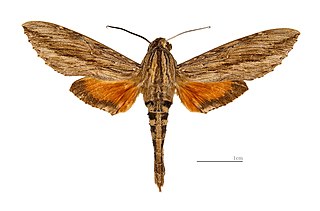
Dilophonotini is a tribe of moths of the family Sphingidae described by Hermann Burmeister in 1878.
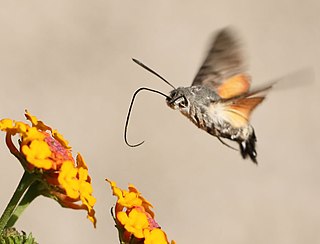
Macroglossini is a tribe of moths of the family Sphingidae described by Thaddeus William Harris in 1839.

Xyloryctidae is a family of moths contained within the superfamily Gelechioidea described by Edward Meyrick in 1890. Most genera are found in the Indo-Australian region. While many of these moths are tiny, some members of the family grow to a wingspan of up to 66 mm, making them giants among the micromoths.
Tessellarctia walterei is a moth in the family Erebidae. It was described by Carlos Rommel Beutelspacher in 1984. It is found in Mexico.
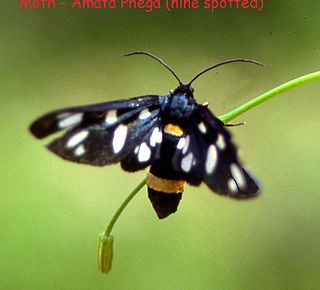
The Syntomini are a tribe of moths in the family Erebidae. The tribe was erected by Gottlieb August Wilhelm Herrich-Schäffer in 1846.














